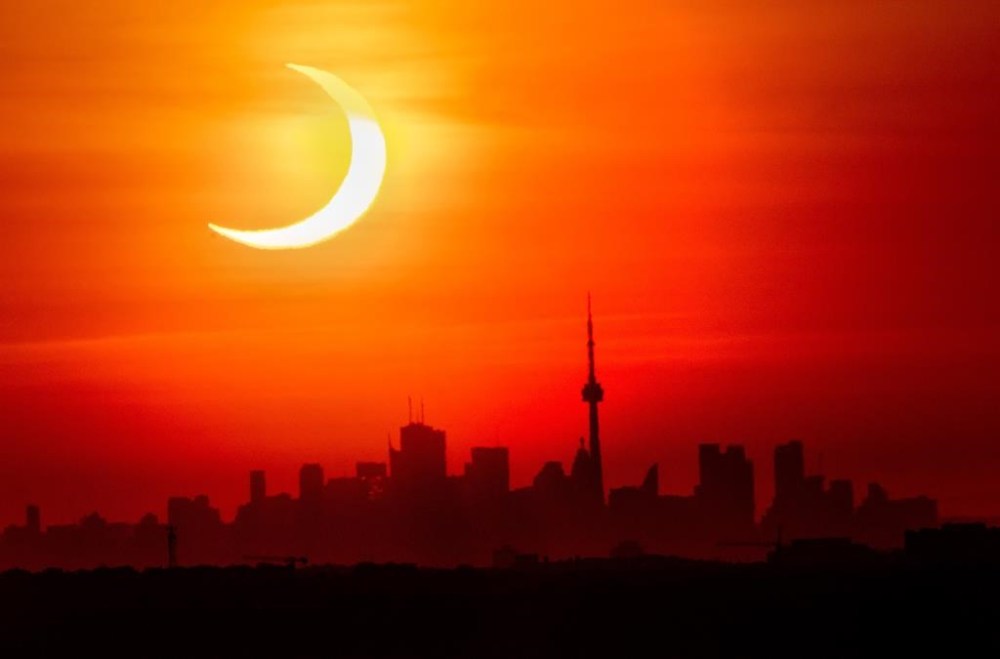Towns on solar eclipse’s path of totality brace for a crush of visitors
Advertisement
Read this article for free:
or
Already have an account? Log in here »
To continue reading, please subscribe:
Monthly Digital Subscription
$1 per week for 24 weeks*
- Enjoy unlimited reading on winnipegfreepress.com
- Read the E-Edition, our digital replica newspaper
- Access News Break, our award-winning app
- Play interactive puzzles
*Billed as $4.00 plus GST every four weeks. After 24 weeks, price increases to the regular rate of $19.00 plus GST every four weeks. Offer available to new and qualified returning subscribers only. Cancel any time.
Monthly Digital Subscription
$4.75/week*
- Enjoy unlimited reading on winnipegfreepress.com
- Read the E-Edition, our digital replica newspaper
- Access News Break, our award-winning app
- Play interactive puzzles
*Billed as $19 plus GST every four weeks. Cancel any time.
To continue reading, please subscribe:
Add Free Press access to your Brandon Sun subscription for only an additional
$1 for the first 4 weeks*
*Your next subscription payment will increase by $1.00 and you will be charged $16.99 plus GST for four weeks. After four weeks, your payment will increase to $23.99 plus GST every four weeks.
Read unlimited articles for free today:
or
Already have an account? Log in here »
Hey there, time traveller!
This article was published 01/04/2024 (566 days ago), so information in it may no longer be current.
TORONTO – Municipalities across Central and Eastern Canada have spent months preparing for an event that will last just three-and-a-half minutes: a total solar eclipse that will cast parts of the country into complete darkness.
Many cities and towns in Ontario, Quebec, New Brunswick and Prince Edward Island are gearing up to host thousands of visitors from across Canada and beyond hoping to catch a rare alignment of the sun, Earth and moon on April 8.
And municipalities are not missing this chance to welcome tourists in large numbers.

Visitors may feel like the busy travel season has come early, with hotels at capacity and seasonal attractions such as live music performances and food trucks available before their typical summer hours begin.
For Miramichi, N.B., the solar eclipse is going to be the highlight of the year’s tourism season, says Paul McGraw, economic development officer for the city about 180 kilometres northeast of Fredericton.
“We recognized the opportunity early in 2023, but then it was like: ‘How can we take advantage of this?'” McGraw recalled.
Miramichi will host solar eclipse-themed events starting Wednesday (April 3) and running into the weekend — with a drone light show, astronomy conference, music festival and an innovation fair welcoming 2,500 students from across Atlantic Canada.
The city, which has a population of about 18,000, has ordered 20,000 eclipse eyewear, while also leaving room for local businesses to sell equipment.
On the day of the eclipse, enthusiasts can head to the Miramichi-Chatham Airport parking lot for an unobstructed view for free, McGraw said.
“We’re upwards of 800 (bookings) right now and we have a capacity of 1,500 (cars),” he said, adding an estimated 6,000 people can be gathered for the eclipse.
“It’s pretty optimistic.”
Elsewhere, demand and prices for hotels and short-term rentals for the solar eclipse weekend have surged.
Niagara Falls and Montreal are the two most booked destinations for that weekend, a report from Airbnb said.
“This eclipse makes Montreal attractive, especially for those living north of the trajectory, so it’s this clientele that we’re expecting to see more of on April 8,” said Montreal public affairs spokesperson Aurélie de Blois in an email.
In the Niagara region, many hotels are booked to capacity, and some charged as much as double their typical price for the weekend. The city is expecting upward of one million visitors over the eclipse weekend.
“We have 14,000 hotel rooms,” said Janice Thomson, president and CEO of Niagara Falls Tourism. “The hotels generally are almost completely booked up.”
She added travellers had made reservations months in advance for the special event, while many locals from nearby regions are expected to come by train or car for the historic moment.
There will be additional GO Transit trains running to and from Niagara Falls that day as the regional transit operator expects the number of travellers to surge. It is also adding extra cars to its trains to accommodate as many people as possible.
Ontario is home to several other spots along the path of totality — where the full eclipse will be visible — including Hamilton, Belleville and Kingston.
A boat trip on Lake Ontario during the eclipse is one option for visitors to Kingston.
“The 1000 Islands Cruise does not typically open this early in their season,” said Ashley Bradshaw, destination development manager at Tourism Kingston. “We don’t usually see our major attractions open until late May and into the summer season.”
Bradshaw added Kingston hotels have also seen an uptick in bookings, going as far back as last fall, and are expecting visitors from Japan, England and Finland.
Port Colborne on Lake Erie, about 30 kilometres south of Niagara Falls, has set up shops to make the day an educational expedition for visitors.
The day will be packed with an inflatable planetarium with astronomical projections, telescope tours to observe sunspots and flares; and Let’s Talk Science with Brock University experts.
“There really is something for everyone,” said Scott Luey, chief administrative officer of Port Colborne.
“If you want to be on the lake, it can be on the lake. If you want to be at one of our parks, you can be at the park,” Luey said.
“We are a front-row seat to the event. It’s a great place to gather.”
This report by The Canadian Press was first published April 1, 2024.


